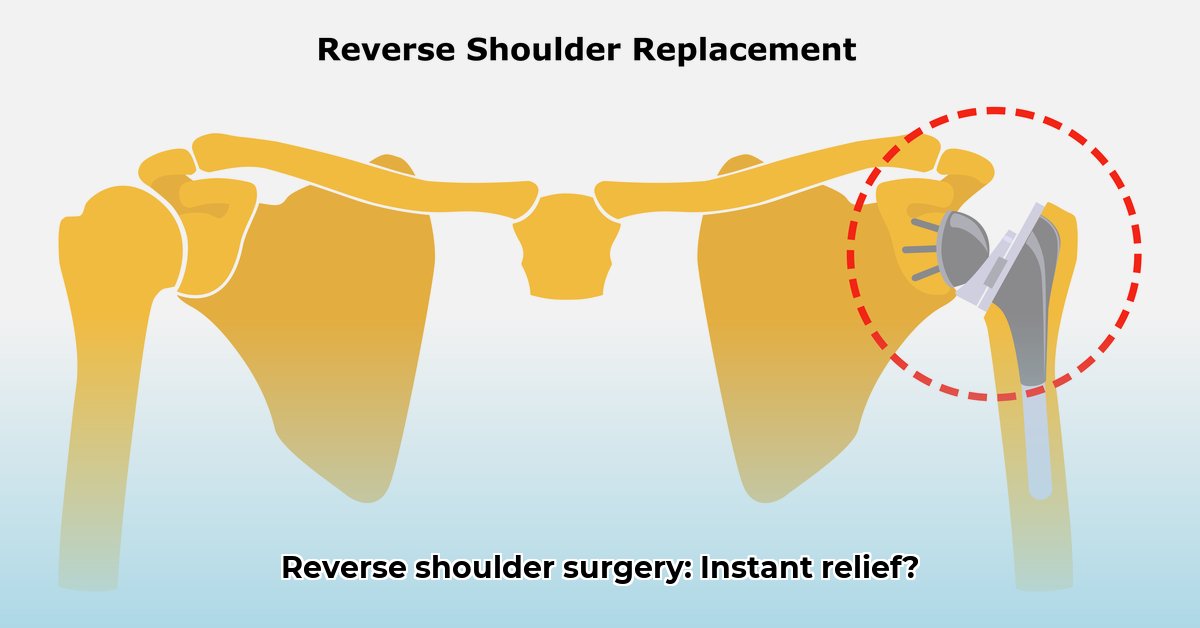
Reverse Shoulder Replacement: Your Guide to a Pain-Free Shoulder
Is shoulder pain cramping your style, eish? Finding it tough to even reach for the koppie of coffee? You're not alone. Many South Africans experience debilitating shoulder pain, often caused by rotator cuff tears or arthritis. This guide explains Reverse Total Shoulder Replacement (RTSR) surgery – a solution that could restore your mobility and ease your discomfort. We'll cover the procedure, recovery, and long-term outlook, using plain English, and a video to help you understand this complex surgery.
Understanding Reverse Shoulder Replacement (RSR)
Forget what you think you know about regular shoulder replacements. RTSR, or Reverse Total Shoulder Arthroplasty, is different. It's specifically designed for people with cuff tear arthropathy – where a torn rotator cuff and damaged shoulder joint cause significant pain and limited movement. Imagine your shoulder as a ball-and-socket joint; a regular replacement replaces worn parts. RSR turns that idea on its head! It changes how your shoulder works, using your strong deltoid muscle to move your arm instead of the damaged rotator cuff. It's like giving your shoulder a brand-new, more powerful engine!
The Operation: A Step-by-Step Visual Guide (with Video!)
Let's outline the key steps, supported by the accompanying video. Think of it as a guided tour, not a scary movie!
- Preparation: Incisions are made to access your shoulder joint. (The video shows this clearly.)
- Joint Preparation: The damaged parts of your shoulder are carefully prepared. (See the precise work in the video close-up.)
- Implant Placement: New artificial components (a metal ball on the shoulder blade and a plastic socket on the upper arm bone) are precisely positioned. (The video illustrates how they fit together.)
- Closure: Incisions are closed and dressings applied. (This final stage is shown in detail.)
Important: Each surgeon's approach might vary slightly, depending on individual anatomy. The video provides a general overview; your surgeon will explain your specific procedure.
Choosing the Right Implant: A Personalised Fit
Implant selection is crucial. It's not a one-size-fits-all approach. Your surgeon considers your age, activity level, bone strength and the extent of your rotator cuff tear to ensure the perfect implant for jou specific needs. The video may show various implant types. Isn't it amazing how technology can be so precisely tailored to you?
Post-Operative Care and Rehabilitation: Your Journey to Recovery
Recovery takes time and dedication. Here's what to expect:
- Pain Management: Expect some post-operative pain, but your medical team will provide effective pain relief. Don't hesitate to speak up if you are in pain!
- Physiotherapy (Physio): This is vital! Physiotherapy helps to restore strength and movement.
- Gradual Activity Increase: Don't rush things. Listen to your body and follow your therapist's guidance.
The video offers a detailed look at recovery and rehabilitation. Remember, geduld, patience is key!
Long-Term Outcomes and Potential Complications
With proper care, RTSR can significantly improve your quality of life, providing lasting relief from shoulder pain and improved mobility. However, as with any surgery, there's a small risk of complications like infection or implant loosening. Regular follow-up appointments are vital for monitoring progress and addressing any issues promptly. The video explores potential long-term outcomes and complication management techniques.
Am I a Suitable Candidate?
RTSR isn't for everyone. Your surgeon will assess your overall health, the extent of your rotator cuff tear and other factors to determine suitability. The video helps clarify the assessment criteria and process, and it's a good idea to watch it before consulting your doctor.
Remember, a chat with your orthopaedic surgeon is the best way to determine if RTSR is right for jou. This guide and the accompanying video provide valuable information to help you prepare for that discussion and understand what to expect. Isn't it empowering to be informed and prepared?
Key Takeaways:
- RTSR is transformative for suitable candidates.
- Implant choice is crucial for long-term success.
- Post-operative care significantly impacts outcomes.
- Being informed empowers you to make better healthcare decisions.